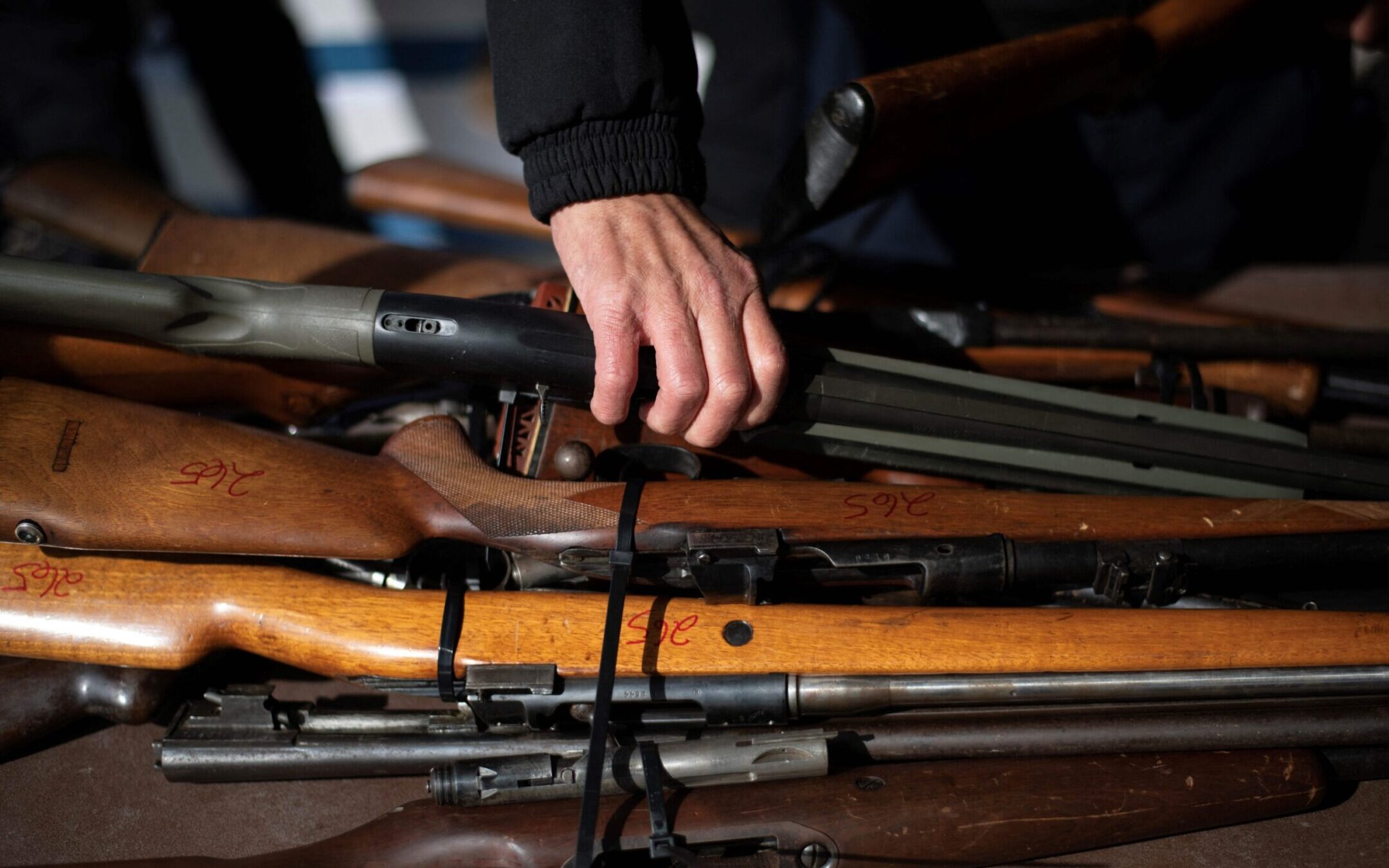Jewish groups back gun restrictions for domestic abusers in high-profile Supreme Court case
The organizations representing Reform, Conservative and Orthodox rabbis are among the groups weighing in on United States v. Rahimi

A police officer moves a rifle during a gun buyback program in Houston, Texas, Feb. 18, 2023. (Mark Felix/AFP via Getty Images)
(JTA) – Following the U.S. Supreme Court’s announcement that it would consider a major case on Second Amendment rights, Jewish groups are joining an effort led by a Jewish organization for survivors of domestic abuse to back gun-rights restrictions for people convicted of domestic violence.
Jewish Women International is leading an amicus brief that also includes the organizations representing Reform, Conservative and Orthodox rabbis, along with several interfaith organizations, in the case United States v. Rahimi.
The case, which the court announced in late June that it would consider in the coming year, concerns whether a law prohibiting people under domestic-violence restraining orders from owning firearms is a violation of the Second Amendment, which says the right to gun ownership “shall not be infringed.” Gun-control advocates worry that the court’s rightward tilt, combined with its willingness to hear the case at all, could point to a ruling that overturns the law.
The faith groups argue that preventing convicted domestic abusers from accessing firearms is not only consistent with the Second Amendment, but also a matter of religious urgency. The Conservative movement’s Rabbinical Assembly, for example, cites the Book of Leviticus in arguing that clergy should not “stand idly by the blood of your neighbor.”
“Rabbinical Assembly recognizes that acts of gun violence, whether perpetrated against the Jewish community or not, are shattering the peace and sanctity of our lives at an alarming rate,” the brief adds.
One story related in the brief, from Rabbi Bruce Kahn of Temple Shalom in Chevy Chase, Maryland, relates how Kahn had counseled a non-Jewish woman who had fled her abusive former partner and is currently helping her and her children flee the area where her partner lives.
In its brief, Jewish Women International notes that one of its members was shot and killed by an estranged husband in 1988, permanently shifting the focus of the group’s mission “to break the silence about domestic abuse in the Jewish community.” It joins the brief’s other Jewish groups: the Reform movement’s Central Conference of American Rabbis; the Rabbinical Council of America, which is Orthodox; the Jewish Gun Violence Prevention Roundtable; the National Collaborative of Jewish Domestic Violence Programs; and the Women’s Rabbinic Network, also from the Reform movement.
Also represented are more than a half-dozen Jewish members of an interfaith coalition against domestic and sexual violence: the Clergy Task Force to End Domestic Abuse in the Jewish Community, Hadassah, the Jewish Community Relations Council of Greater Washington, the Jewish Council for Public Affairs, National Council of Jewish Women, Network of Jewish Human Services Agencies, and the Religious Action Center of Reform Judaism.
Jewish groups and activists have long argued for stringent rules to keep guns out of the hands of people who might use them for dangerous purposes. Multiple Jewish groups, including Hadassah and the Orthodox Union, teamed up to press for federal gun-control legislation in 1968. The 2000 “Million Mom March” for gun control was launched by a woman who was distraught about the 1999 shooting by a white supremacist at a Los Angeles-area Jewish community center in which multiple children were wounded; some of the children’s parents became organizers. And Jewish students and parents from the Parkland, Florida, high school where 17 people were killed in 2018 have emerged as leading gun-control activists in the years since.
This article originally appeared on JTA.org.
A message from our Publisher & CEO Rachel Fishman Feddersen

I hope you appreciated this article. Before you go, I’d like to ask you to please support the Forward’s award-winning, nonprofit journalism so that we can be prepared for whatever news 2025 brings.
At a time when other newsrooms are closing or cutting back, the Forward has removed its paywall and invested additional resources to report on the ground from Israel and around the U.S. on the impact of the war, rising antisemitism and polarized discourse.
Readers like you make it all possible. Support our work by becoming a Forward Member and connect with our journalism and your community.
— Rachel Fishman Feddersen, Publisher and CEO

























